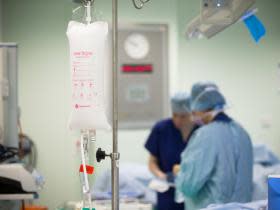Ministers refuse to rule out repeat of blanket operation cancellations this winter
Patients could again face blanket cancellations this winter as ministers refused to rule out emergency measures to address winter pressures in the underfunded NHS, MPs have warned.
The Department of Health and Social Care gave no guarantees on the mass cancellation of non-urgent operations, such as hip surgery and cataracts, which occurred for the first time last year, a report by the Public Accounts Committee (PAC) said.
While the government is trying to minimise cancellations by telling hospitals to book fewer elective operations in the winter months, waiting lists are currently at their highest levels for a decade.
The PAC also warned that no additional funding is going to NHS hospitals, ambulance trusts or GPs to manage demand this winter, in its report on the Department of Health and Social Care accounts for 2017-18.
Councils have received £240m for social care to ensure patients can be discharged when well, but the report notes this “would only be equivalent to £1.6m per authority despite them facing significantly larger cuts to funding”.
“We are concerned that the department’s preparations for winter, and the decision to allocate additional winter funding solely to social care services, may not be sufficient to meet demand,” the report said.
“The department has a record of implementing annual short-term fixes to deal with the additional demand placed on NHS services during the winter, for example cancelling elective procedures in January 2018.”
“[Ministers] would not provide a guarantee to us that a blanket postponement would not occur again," it adds.
There were 22,800 fewer elective operations in January 2018, compared to January 2017 following the recommendations from the National Emergency Preparedness Panel.
The measure freed up the equivalent of 1,400 beds for more urgent cases in January, however this was not sufficient to prevent the health service experiencing its worst winter on record.
Trusts warned The Independent in October that they had even less chance to prepare for this winter as experts warn it will be “tougher than ever”.
The PAC also warned that the Department of Health had again used a last minute transfer of funds from its budget for building and equipment upgrades to keep services running – for the fourth year running
Meanwhile close to half of NHS trusts and a third of clinical commissioning groups are overspent.
This situation is “unsustainable” and while the first tranche of the £20.5bn budget uplift pledged by Theresa May by 2023 will arrive in April 2019 the PAC the Department of Health risk “losing its way”.
“As Christmas approaches amid news of overcrowded hospitals, patients experiencing the worry of waiting for important treatment or surgery will take little comfort from bottom-line figures for national health spending,” PAC chair Meg Hillier said.
“The department’s lack of clear Brexit planning could threaten the supply of medical equipment. Staff shortages could deepen. The potential consequences for patients are serious.
Read more
NHS extends suspension of all non-urgent care
“These and other uncertainties are amplified by the continued absence of the government’s promised 10-year plan for the NHS, its promised plans for social care, and its promised plans for immigration.
Saffron Cordery, deputy chief executive of NHS Providers which represents hospital and ambulance trusts, said: “Going into winter the pressures on the health and care system remain crystal clear.
“The NHS is entering its busiest time of year with record levels of demand for emergency care, severe workforce shortages and as this report shows a very difficult financial position.”
A Department of Health and Social Care spokesperson said: “We are investing an extra £20.5 billion a year to guarantee the future of our health service through the NHS Long Term Plan. We will consider the recommendations in today’s Public Accounts Committee report carefully and will publish a response in due course.”

 Yahoo News
Yahoo News 
